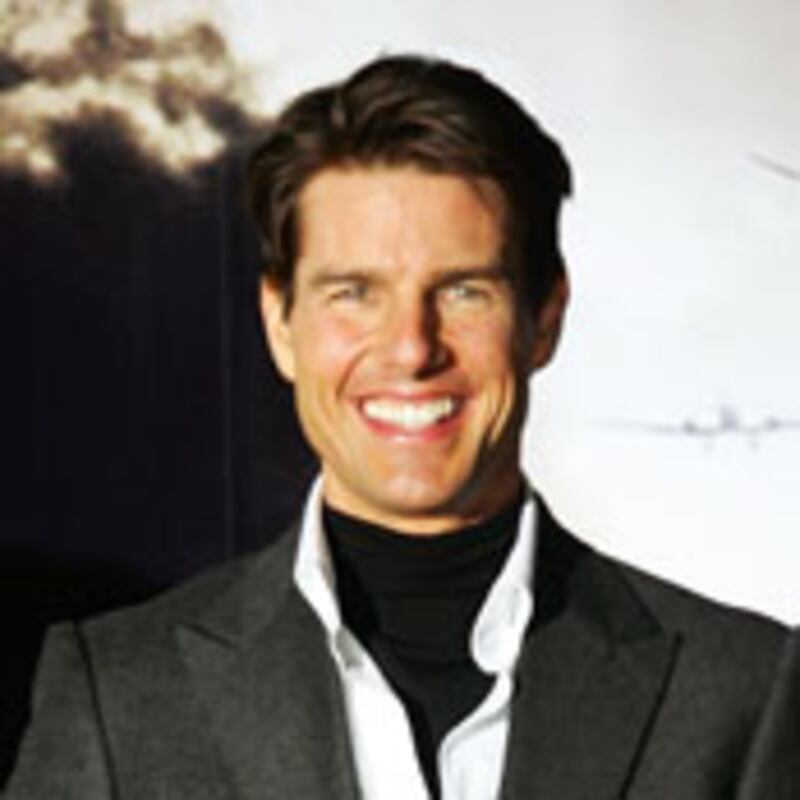
Tom Cruise does not want to be No. 2. A week ago, Fox moved Cruise's upcoming action-romance, Knight and Day, from its July 2 release date to the previous weekend. And so Cruise dodged a bullet: The comeback movie pairing him with Cameron Diaz got out of the way of a behemoth known as The Twilight Saga: Eclipse.
In the middle of a carefully orchestrated comeback, Cruise did not want his film to open at anything but No. 1. He did not want to look like the older alternative to the wan youths of Twilight. "Let's face it, he is resurrecting his career," says an executive working on the project. "This is an incredibly important movie for him."
“I’ve never in my career seen a star actually listen when people say, `This is what is wrong.’ ” But Cruise did, says a key member of his inner circle.. “He actually said, `I was arrogant.’”
• Kim Masters: Is Taylor Lautner Sabotaging His Career? Choosing this movie—in a genre that suits his audience and teams him with a big-name co-star—was just one of a number of smart moves that Cruise has made to course-correct a career that had jolted off the rails. The carefully orchestrated process—following a highly unusual "intervention" by a cadre of professionals who explained to Cruise that his career was actually in trouble—makes an interesting contrast to the path followed by another major star who's trying to rebuild his relationship with fans.
Mel Gibson went through a notorious drunk-driving arrest in 2006, accompanied by a reported anti-Semitic and sexist outburst. And then came a divorce from his wife who stayed with him for 28 years and bore him seven children. And then, a young girlfriend and another baby.
Meanwhile, Cruise had his couch-jumping episode on Oprah, his tangle with Matt Lauer on the Today show and a viral tape in which he seemed to be high on enthusiasm for Scientology. Gibson's transgressions may have been more serious, but Cruise came off as weird—not a great quality for a popcorn-movie icon.
Gibson's comeback role, his first in eight years, was in a 2010 movie unfortunately titled Edge of Darkness. In his public appearances, he looked ill at ease. He walked out of a Los Angeles Times interview, citing jittery nerves because he'd just quit smoking. Though he returned to the conversation three days later and the resulting article made him appear respectful, the story began with a description of the walkout.
And that went far better than Gibson's appearance on WGN-TV in Chicago. "Do you think that the public will perceive you any differently after all that's been in the news about you?" an interviewer asked. Gibson hesitated and then said, "What are you referring to specifically?" The response made him seem either far too coy or simply unprepared for an extremely foreseeable question. When the interviewer persisted, Gibson replied with obvious irritation that he has moved on. With that, the interviewer wound up the conversation. "Asshole!" Gibson snapped, with his mike still live. And that, of course, went viral.
"Mel is a very difficult client to control," says a publicity executive who has worked with him. Another veteran publicist says Gibson's problem goes back to the aftermath of the arrest. The actor never issued a clear-cut apology, she says, which is mandatory in those situations. But another high-level executive who has worked with Gibson isn't so sure that would have helped. "There's nothing he could say that would convince me or anybody else that he doesn't feel that way, deep down," he says.
More to the point, the publicist says Gibson looked fragile as he promoted Edge of Darkness and that he appeared to need more help than industry experts can provide. "He's got to get healthy," she says.
Edge of Darkness failed to connect with audiences, grossing just $55 million worldwide. That could reflect as much or more on the movie as it does on Gibson, and one executive who has worked with Gibson says he is "too talented a director and maybe as an actor" to fade away. "He could have a solid career until he dies," this observer continues. "But he'll never reach the same levels of popularity."
Gibson's publicist, Alan Nierob, says he disagrees with all these assessments. "Things are going well" for Gibson, he says, pointing out that he's lined up with projects as an actor and director for the next several years. Nierob says the Los Angeles Times interview was a net positive, as were most of Gibson's other press appearances. "He went out and was responsible and sold the film for Warner Brothers," Nierob says. "He did a magazine cover story, a satellite tour, as press junket and toured internationally. You can't ask for more than that."
As for the assertion that Gibson appeared unhealthy, Nierob responds, "He's healthy for a guy who's an alcoholic who's smoked for 40 years. He's trying to be healthier."
"He's healthy for a guy who's an alcoholic who's smoked for 40 years," says Gibson's publicist Alan Nierob. "He's trying to be healthier."
Unlike Gibson, Tom Cruise is not a multi-hyphenate who can retreat behind the camera. And in almost every way, his issues have been very different from Gibson's—but they have been equally high profile. In 2004, he fired his longtime publicist, Pat Kingsley, and replaced her with his sister, who has more credentials as a fellow Scientologist than as a movie publicist. His image suffered and—as an executive who worked with him at the time puts it—"everything that he was doing off camera had a higher profile that what he did on camera." Still Cruise showed amazing resilience. Valkyrie, a movie released at Christmas 2008 about Hitler, grossed $83 million domestically and strikingly, an additional $117 million overseas.
But even before Valkyrie was released, Cruise had been through a sort of career intervention. Following a test screening of the film in August 2008, a small circle that included top MGM executives and a seasoned marketing consultant confronted him in a manner that is rare in Hollywood. "I don't know anyone at a studio who's going to do it," says one executive who was not involved, adding that the agents and publicists on a star's payroll are also extremely reluctant to risk upsetting their clients. In Cruise's case, the initial conversation was followed with a meeting at his house that did include his agents.
An insider says Cruise's reaction was to express relief. "He would tell you that nobody told him the truth," this person says. At his advisers' urging, he undertook a gradual and carefully orchestrated campaign to undo the damage. "He faced up to a lot of hard things and went about making things better," says a key member of the Cruise inner circle. "Mel Gibson never did any of that... I've never in my career seen a star actually listen when people say, `This is what is wrong.' " But he says Cruise did. "He actually said, `I was arrogant.'"
Amanda Lundberg missed the confrontation—she's only been his publicist since late January—but she notes that Cruise "has been successful for 25 years. He's incredibly smart and knows what it takes to sustain that success better than most people in the business."
Cruise had already taken a step forward. In the spring of 2008, he had done a two-part return engagement with Oprah Winfrey—including one session at his home in Telluride, Colorado. He handled questions about the couch-jumping and apologized for his attack on Brooke Shields. He talked about Scientology and even about rumors that he was not his daughter's biological father. The New York Times said the appearance was "less like a movie-star interview than like a news conference with a political candidate seeking to undo a gaffe."
But it wasn't enough. That December, Cruise delivered a self-deprecating top-10 list on The Late Show with David Letterman for "The Craziest Things People Say About Tom Cruise on the Internet." No. 4: "I believe all emotional and psychological disorders can be cured with Vicks Vapo-Rub."
In October 2009, Cruise was a "surprise" guest when Matt Lauer was roasted at the Friar's Club. "Believe it or not, Matt and I are friends," he joked. "I know some of you might find that surprising considering that we had that little thing." Cut to a video clip of an intense Cruise calling Lauer "glib." Cruise joked about Lauer but more importantly, he again made fun of his own behavior. The star was "trying to fix everything where he might have offended people," says a top Cruise adviser. He "showed everybody that he knew what dumb things he did."
And Cruise changed his look. He had been hanging around with David and Victoria Beckham, says one member of his team, and turned out in "European pants and black flow-y shirts." He shifted to an "American classic" look—jeans, light-colored shirts, maybe a jacket.
As he moves to publicize Knight and Day, an insider says Cruise will do a limited number of interviews—and he will do many of them with Diaz. "Not doing a lot should not be misconstrued as him hiding," she adds. At this point, "there's nothing to talk about except the movie... They have good history and good chemistry."
Still, one veteran publicist who is not involved with the project says the battle to rebuild Cruise's image is not yet won. The star is still not great with the media, she says, because he's "not good at thinking on his feet... Tom is so measured that it comes across very stiff and now that people are seeing him through different glasses, every little thing that used to be excused is amplified."
And this publicist believes that "the fact that he's a Scientologist is the root of the problem... Now that it's been exposed, you can't but it back in the bottle." She thinks Scientology handlers are still deeply involved in making decisions about Cruise's career. Those who represent him say that's not so. "He's decided that whatever he does for the church is private," says a central member of the Cruise team.
Another studio executive who isn't involved with the project believes Knight and Day "is a great publicity rehab movie" because "it's not just a Tom Cruise movie. You get Tom Cruise and Cameron Diaz in a genre that people love to see him in—action with a little comedy. And she can take a little bit of pressure off of him." Follow that with Mission: Impossible 4, he says, and "the public could forget pretty quickly. They might say, `Yeah, he's weird,' but before they would have said, `He's crazy, he's off-putting.'"
On the plus side, this executive says, Cruise is still "a huge international star" and there aren't many of those left. On the minus side, Cruise is dealing with a factor that has nothing to do with their beliefs or his actions.
There's a reason that Cruise wouldn't want to go head-to-head with the Twilight ensemble. And that's because there's no escaping the fact that at 47, Cruise is old enough to be the daddy of them all.
Correction: This article originally stated Cruise's Letterman appearance came after the Oprah interview. It has been updated.
Kim Masters covers the entertainment business for The Daily Beast. She is also the host of The Business, public radio's weekly program about the business of show business. She is also the author of The Keys to the Kingdom: The Rise of Michael Eisner and the Fall of Everybody Else.






